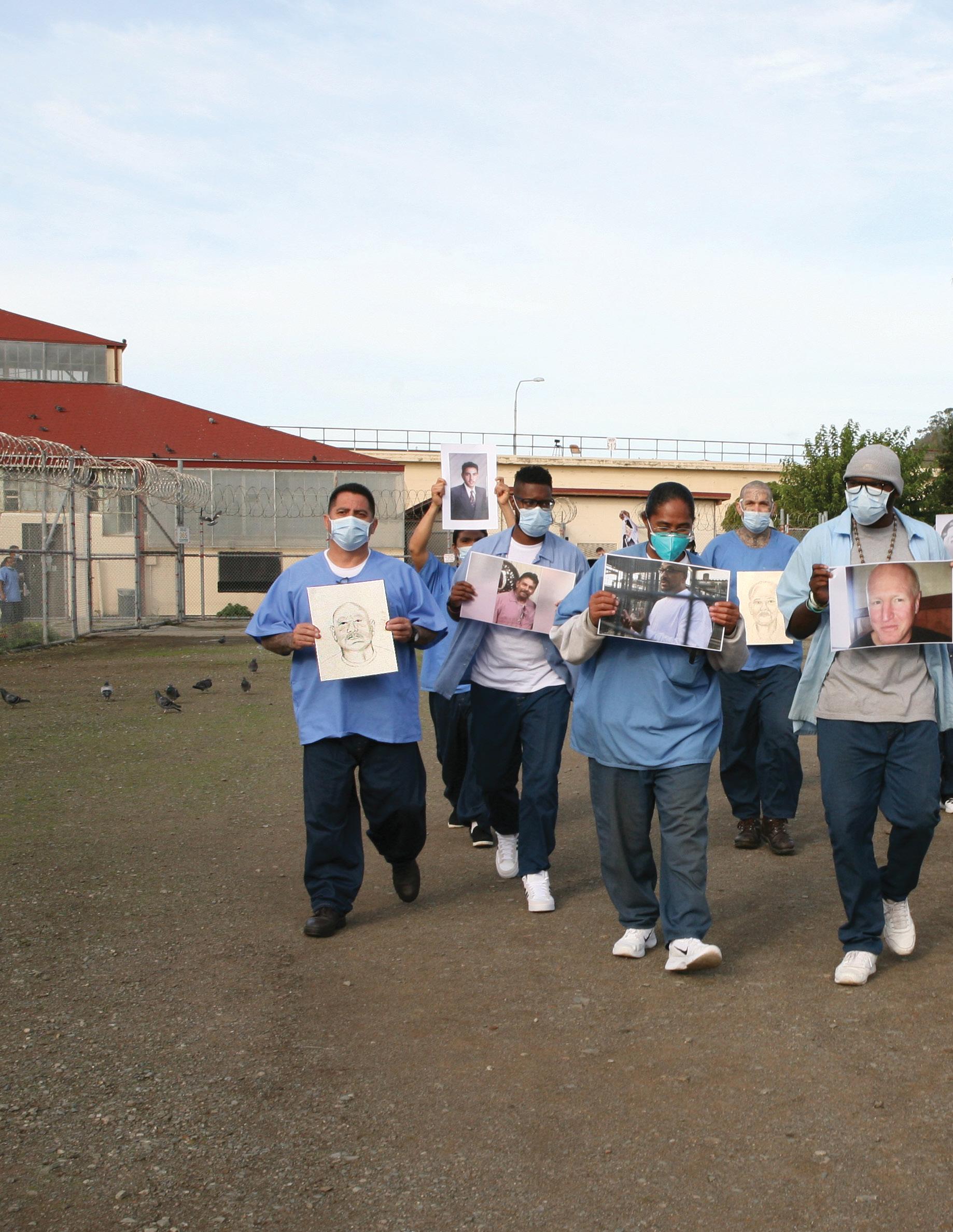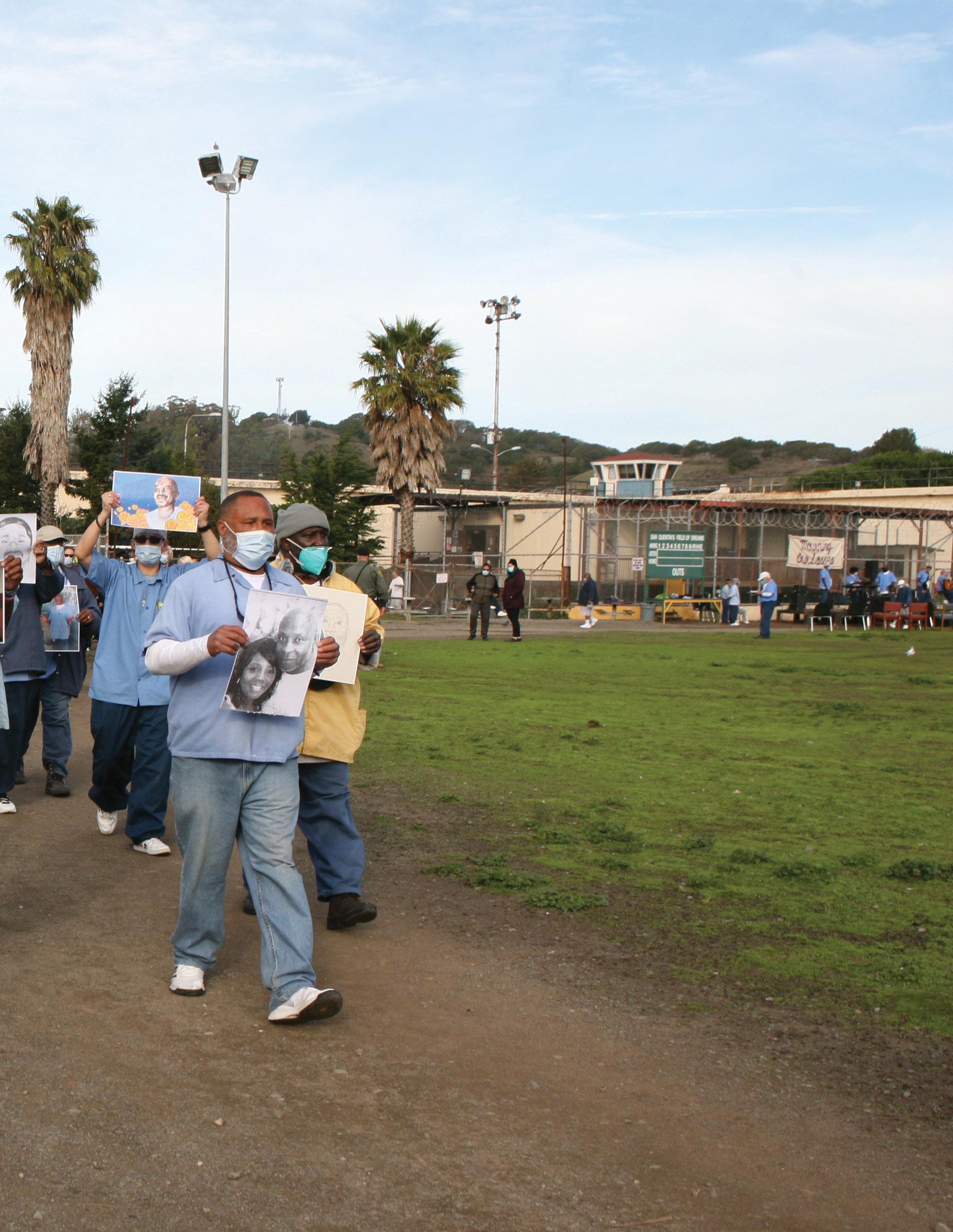
8 minute read
The March Of Memories
By Edwin E. Chavez
On a Friday afternoon in November, an event dubbed Mourning Our Losses was held on San Quentin’s Lower Yard. It brought together about 200 people to pay tribute to the many lives lost during the COVID-19 outbreak. Attendees included the prison’s residents, people formerly incarcerated and volunteers from the surrounding San Francisco Bay Area.
The event was organized by Mourning Our Losses volunteer Kirsten Pickering and hosted by San Quentin resident Arthur Jackson. Mourning Our Losses is a Texas-based nonprofit created to track and highlight the moral cost of mass incarceration nationwide, and to honor all those who have died while living or working behind bars.
The event began with participants walking a commemorative lap of silence on the Lower Yard. The walkers held up photographs and sketches of 25 of the people lost to COVID-19 at San Quentin.

“Walking with a photo around the track in silence was a very reflective reality check of how serious and dangerous COVID-19 is,” said Gordon Kimbrough, an incarcerated substance abuse counselor.
Bands performed and speakers addressed attendees, to encourage and inspire survivors and to reminiscence about the trials endured by San Quentin survivors of COVID-19.
Some San Quentin residents read poems in honor of fallen friends and to relate their personal experiences during the COVID outbreak.
One of them was Warren Corley, who read a poem he wrote about his dear friend Darryl Gualt, one of the mourned.
“Darryl loved the Lord. He was always putting others before himself,” Corely said. “We miss him dearly. He died the way he lived, with courage, joy and giving people whatever was needed.” Before falling victim to COVID, Gualt was a 25-year cancer survivor.
Gualt was also remembered by event organizer Pickering, who taught philosophy classes at San Quentin in the past. “I think of him often. He was one of my students here at San Quentin,” she said.
Michael Moore shared a piece called “13 Bars,” named for the style of door that made men at San Quentin so vulnerable.
“There are 13 bars, three inches apart, that allow for air to circulate into our cells,” Moore said. “People were dying all around me, literally from COVID wafting through the bars and into our lungs. I had to just sit and wait my turn.”
In honor of his friend Eric Warner, who died from the virus, Tony deTrinidad read “Invacuate-19.” The poem described the frequent sound of alarms, which indicate someone was in pain or was being placed on a gurney by emergency responders.
“Every time an alarm went off I would wonder who was dying now,” said deTrinidad. “Who else is in pain?”
Several of the prison’s religious leaders offered spiritual messages to the audience. Hector Frank Heredia, Native American chaplain, spoke about the dead. He reminded listeners to remember them in our hearts because they are our people.
“To all our relations we come in a good place to pray for those who have passed on,” said Heredia. “Most of those brothers that passed, I knew them on the row [Death Row]. They are not forgotten; we don’t leave anyone behind.”
Reflecting on how dealing with the deaths of others can be difficult for many, Imam Mohamed, Muslim chaplain, said that the reality of death can weigh us down if we deny it. Therefore, it is important to ask God to bring us together as one.
In tribute to the lives lost, a moment of silence was accompanied by the sounds of bells rung 27 times from a band member’s electronic keyboard. According to Buddhist tradition, the number 108 represents infinity; when divided by four it equals 27.
Among the musical guests at the event was David Rodriguez, bandleader of Treasure Out of Darkness. “My sister passed away from COVID-19. The way I was able to play my music is something to ease the pain,” said Rodriguez.
Darryl Ferris leads alternative rock band Continuum. He knew five people who lost their lives during the pandemic. “It is nice to honor those victims, but also to honor these around the country and the world. I pray the Lord will give all the surviving victims comfort for their loss,” he said.

The rap group Da Conglomerate sang an inspirational piece aimed at a younger audience. The message in the rap was geared to be a public service announcement, according to Steven “Rhashiyd” Zinnamon.
“It means different things to all of us,” said Zinnamon. “It shows the difference in the growth prior to us having insight into our younger selves.”
Others present at the remembrance included James Fox, who teaches yoga at San Quentin, and Sherie McNaulty, a sponsor for the reentry/non-violence self-help program No More Tears.
Fox said that grief is a process that has no time limit and “has a cousin named trauma.” McNaulty agreed. “I think this was good and long overdue,” said McNaulty. “It gives people the freedom to mourn. Sometimes people don’t even know that they have the freedom to mourn.”
Pickering talked about how she became a Mourning Our Losses volunteer. She spoke about lives lost in prisons, jails, juvenile halls and immigration detention facilities. She said she was concerned after reading a University of California Los Angeles (UCLA) study, “COVID-19 Behind Bars Data Project,” that showed that the outbreaks and deaths were going unnoticed.
“By April 2020, many could see the political leaders were not going to act, or [were] not [acting] quickly enough,” said Pickering. “So a group of us came together, people formerly and currently incarcerated, people who had worked or volunteered inside, to create a way to remember the lives of the people we were losing around the country, and to mourn and celebrate them together.”
Around the time the UCLA study came out, Mourning Our Losses was founded by Kelsey Kauffman, formerly a warden of a women’s prison in Indiana. Later she advocated for the incarcerated. Perceiving that politicians and officials were not moving fast enough to address prison overcrowding, she worked for de-incarceration.
A few family members of San Quentin’s COVID victims heard about the Nov. 5 event. They were moved to send in words of love and gratitude directed to the people in blue and all of the other attendees at the event.
The Mourning Our Losses inside team included SQNews staffer Juan Haines and Brian Asey, SQTV producer. The outside team members were Tom Lapinski and Pickering. Haines, Asey and Pickering read messages received from family members of victims. The messages expressed appreciation for the event memorializing their loved ones.
“When the prison was on lockdown, I was keeping track of the people who were dying,” said Lapinski, who has been a volunteer at San Quentin for nearly 40 years. San Quentin’s lockdown lasted from March 2020 until May 2021.
San Quentin medical staff also addressed the crowd, reflecting on the losses being memorialized, and the overall impact and the trauma San Quentin residents endured during the pandemic. Dr. Alison Pachynski, San Quentin’s chief medical officer, reminded the gathering how important it is to pause and reach out to someone during a time of mourning. Dr. E. Anderson, San Quentin Suicide Prevention Coordinator, introduced Brothers Keepers, a support group run by prisoners. The group offers counseling to prisoners going through crises due to loss of loved ones, illness, board denials and other concerns.
Antwan “Banks” Williams, a well-known voice of Ear Hustle before paroling from San Quentin, closed out the event with an inspirational rap song. His moving lyric summed up the event well.
“I never really felt like somebody — until somebody told me I could be somebody — now I’m somebody — who just wants to tell somebody — that you’re somebody — you’re somebody to me,” rapped Williams.
To date, Mourning Our Losses has made about 900 contacts with incarcerated people in 41 states. The organization has 24 incarcerated volunteers who have memorialized more than 250 people. Volunteers come from California, Colorado, Connecticut, Delaware, Illinois, Indiana, Louisiana, New York, Pennsylvania, Texas and Virginia. Others come from prisons in Georgia and from the Yale Undergraduate Prison Project.











